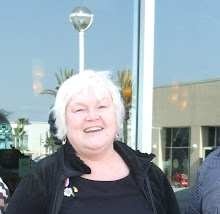I think that humans do have a basic instinct to “interact and work as a group” (Rheingold). Rheingold’s point that the ancients had to hunt together to bring down a mastodon demonstrates the rise of the cooperative nature of humans. I asked several of the people with whom I live in a retirement community if they thought that it was human nature to interact and work as groups, and the response was interesting. The women seemed to think that it is basic human nature, but the men, not so much. In fact, Tom said that hunters today do not hunt in groups, that they need to be alone so as not to disturb the prey. So, I used the mastodon hunting as an example of the need to hunt in groups. He made a sexist reference to the idea that women can’t hunt because they can’t be quiet. So I pointed out that it was the stealth that the group needed, not the gender.
Mary pointed out that her husband—who is in his mid-80s—was never a team player. I posited that the education and early business practice that her mate experienced were probably more competitive than they were cooperative. This leads me to think about the possibility that nature also provides leaders, alpha males and females who organize and facilitate group work on a natural level. I often times have difficulty operating in a group unless I am in charge. I know that it is a personality defect, but there it is. However, I must laud my partners in my group in 8845. They have let me be the boss, but they have also committed to and delivered their part of the group work as promised. I am lucky to have them as partners.
The Internet has certainly provided the venue for the group work on the class projects. We have worked in Skype to have group meetings and Google Docs to create the class projects. I am sure there are other web-based interfaces that can and will facilitate groups to work together. I am a little disappointed that I am not teaching any more to be able to use these programs with students.
Rheingold, H. (2005). Howard Rheingold: Way-new collaboration. Retrieved from
http://www.ted.com/index.php/talks/howard_rheingold_on_collaboration.html

Cynthia, this a quite entertaining and very much true. Some people are born to lead and want to lead, but some are like the men with whom you spoke---meaning, they think that they can do it best if working alone.
ReplyDeleteIn most educational settings now, the idea of collaboration is being promoted. As of about 3 years ago, teachers in my district have been allowed 2 planning periods per day. One to plan individually and one to meet with members in the department under the leadership of a campus instructional leader. I am one of the campus leaders and I am over the Social Studies group. They all have commented that this collaboration is the best thing that has happened because they have learned a lot by bouncing ideas around.~~C. Penny Penagraph
Cynthia:
ReplyDeleteGreat example of collaborative efforts!
Rheingold (2005) said humans used their natural instincts to interact and work together to build a society. Leaders and followers were collaborated to build this society. Collaborative efforts were successful because some people were willing to lead and others were willing to follow.
I applaud leaders I believe they have special gifts of organizing and delegating duties. Leaders are important figures; however, they cannot lead unless someone follows. Collaborative efforts would not be possible if some would not willingly relinquish their personal agendas in favor of an agenda which would be beneficial to a multitude of people.
Technology has impacted collaborative efforts significantly in the past decade. Technology can be utilized to connect with people around the world so they can express their ideas, share research, exchange personal testimonials within a matter of minutes. Time is a critical factor when individuals work to finalize projects or disclose solutions through collaborative efforts.
“Howard Rheingold: Way-New Collaboration”
http://www.ted.com/index.php/talks/howard_rheingold_on_collaboration.html